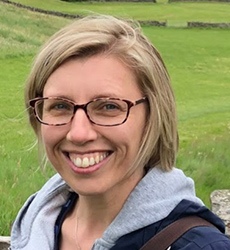Dr Jane Freeman
What is your job title?
I’m a Clinical Academic Fellow in Clinical Microbiology and a Registered Clinical Scientist.
Which NHS and academic institutions do you work for?
I am employed by the University of Leeds and hold an honorary contract with Leeds Teaching Hospitals Trust.
What do you like about being a clinical academic?
I love being able to do research that will ultimately benefit patients, whether that is fundamental research – working out what makes an organisms tick, or respond to its environment to much more applied research in clinical studies, by studying how organisms are affecting patients, evaluating new treatments in clinical trials, developing better testing technologies etc. I love being the bridge between academia and the NHS where the research will ultimately be put into practise, and I think it’s a crucial part of healthcare and medical research.
The COVID pandemic has really underlined how crucial it is to have NHS scientists who really understand how the organisation, testing and clinical management of patients work, doing research for the benefit of those patients. Clinical academics are the drivers of this hugely valuable translational research, and uniquely placed to innovate and continue to move healthcare science forward.
Can you briefly describe how you became and developed as a clinical academic?
After a B.Sc in Medical Microbiology, I did a PhD on Clostridium difficile, which sparked a real interest in research in that organism and group of patients in particular. After a Post-doc, I moved to the NHS to train as a clinical scientist and complete my state registration. Throughout my training, I continued researching and began to lead my own projects, some small and some large – including Pan-European epidemiological projects. I applied for an NIHR ICA Clinical Lectureship and was successful, and shortly after was offered a Clinical Academic Fellow post at UoL.
Give one example of where your work has changed practice?
A really simple case was in my first few weeks as a PhD student when I suspected the cell line we were using was very sensitive to C. difficile toxin. I carried out an evaluation against other cell lines and found that was the case, leading to a change in the diagnostic laboratory practise – we replaced it with a more sensitive cell line that was easier to maintain and harder to accidentally kill! Sometimes, really simple observations and evaluations can make a big difference.
What advice would you give to a healthcare scientist who is an aspiring clinical academic?
It’s the best job in the world. No two days are the same. If you’re interested in it, definitely go for it!
Talk to people in the area you are interested in – I think from experience, it is best to have a well-established research group around you rather than trying to go it alone. You’ll get support you didn’t realise you needed from people in similar positions to you.
Talk to as many people who are clinical academics as you can and find out their experiences and advice and consider having a mentor – its not a well-defined path just yet, and it is good to have someone to talk to and bounce ideas off as you go along.
If you don’t have much research experience, think about dipping your toe in the water with some research delivery, or applying for the NIHR PCAF to fund some training.
